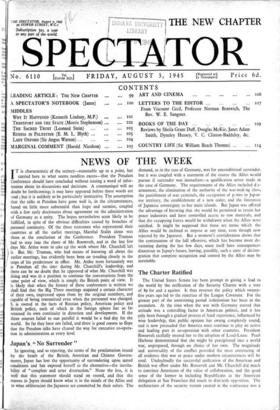NEWS OF THE WEEK
IT is characteristic of the secrecy—reasonable up to a point, but carried here to what seems needless excess—that the Potsdam Conference should have concluded without issuing a word of infor- mation about its discussions and decisions. A communiqué will no doubt be forthcoming; it may have appeared before these words are read ; but it is unlikely to be particularly instructive. The assumption that the talks at Potsdam have gone well is, in the circumstances, based on little more substantial than hope and surmise, coupled with a few early disclosures about agreement on the administration of Germany as a unity. The hopes nevertheless seem likely to be fulfilled, in spite of the obvious difficulties caused by breaches of personal continuity. Of the three statesmen who represented their countries at all the earlier meetings, Marshal Stalin alone was there at the conclusion of the Conference. President Truman had to step into the shoes of Mr. Roosevelt, and in the last few days Mr. Attlee went to take up the work where Mr. Churchill left it. But Mr. Truman, whc had means of knowing all about the earlier meetings, has evidently been bent on treading closely in the steps of his predecessor in office. Mr. Attlee most fortunately was at Potsdam all the time during Mr. Churchill's leadership, and there can be no doubt that he approved of what Mr. Churchill was doing and was in a position to continue the conversations from the same point of view, which is simply the British point of view. It is likely that when the history of these conferences is written we shall find that the Big Three meetings acquired a certain character of their own, impressed upon them by the original members, and capable of being transmitted even when the personnel was changed. It is rooted in the facts of Russian policy, American policy and British policy, each of which in the foreign sphere has so far retained its own continuity in direction and development. If the three courses failed to run parallel it would be a bad day for the world. So far they have not failed, and there is good reason to 'Tope that the Potsdam talks have cleared the way for executive co-opera- tion in administration at every level.






















